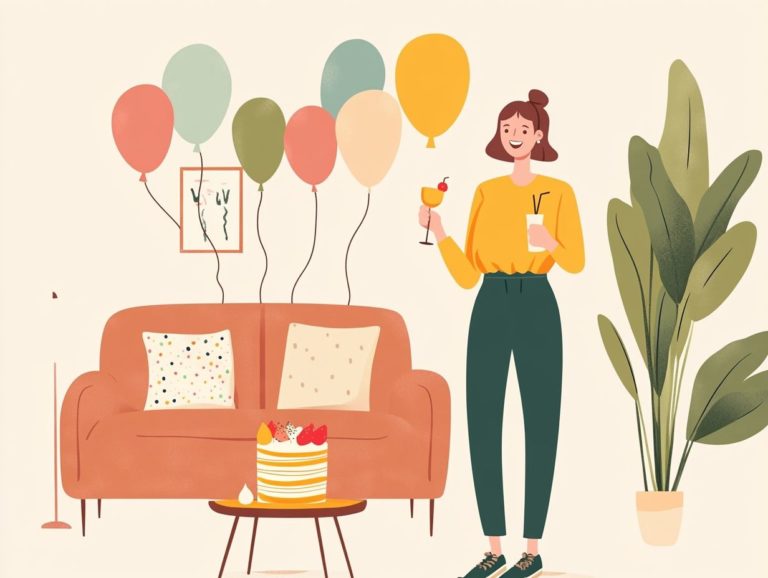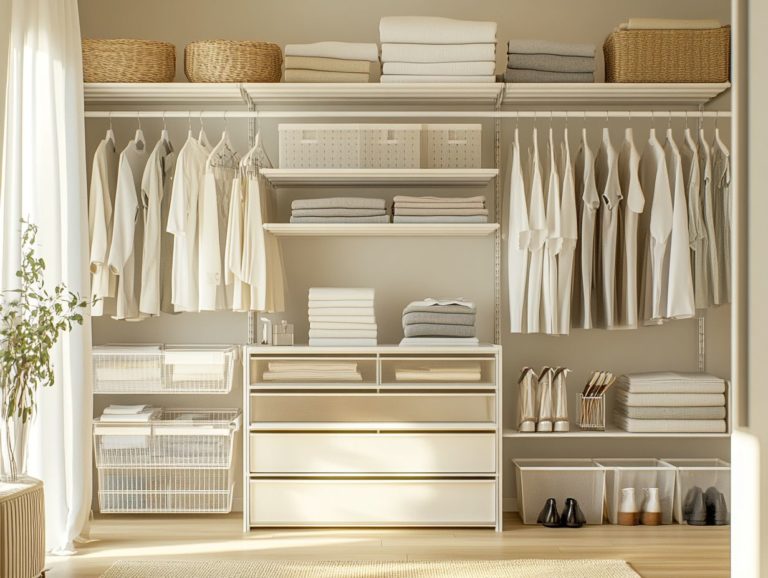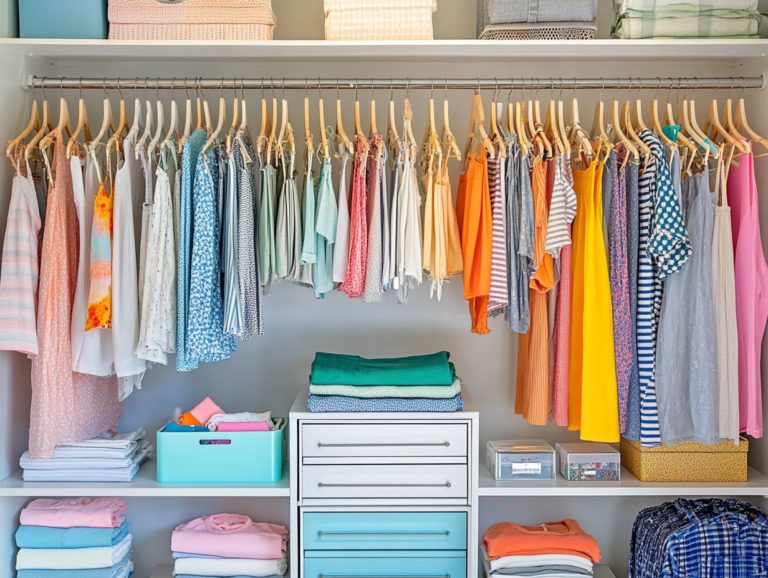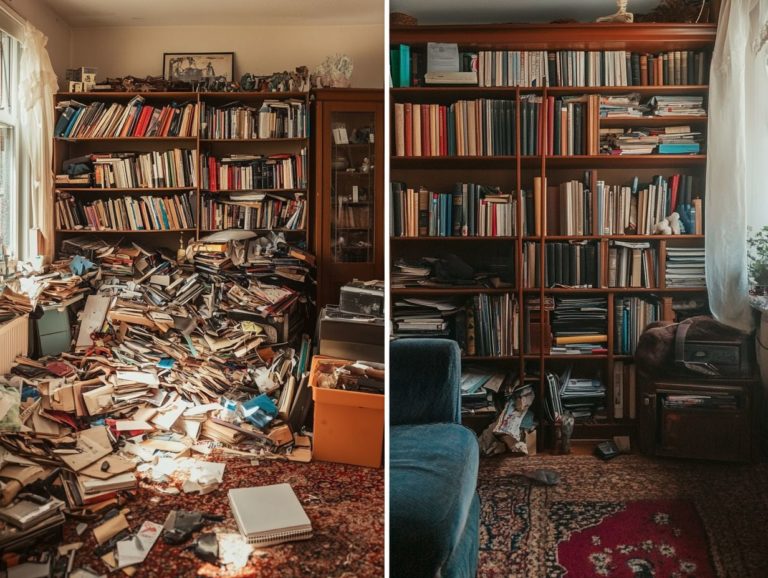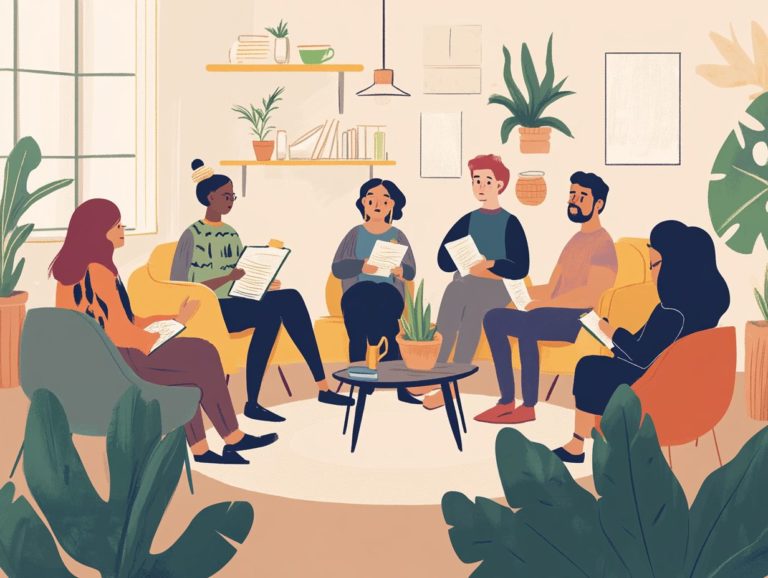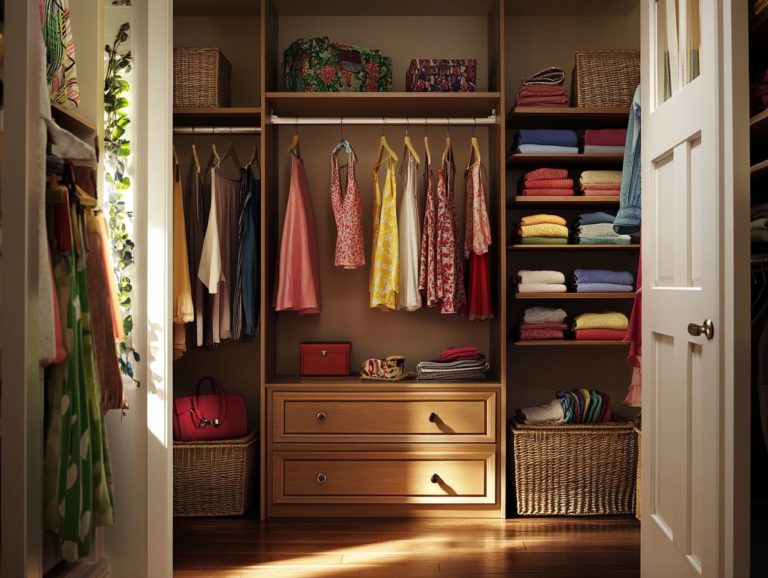How Decluttering Can Improve Mental Health
Clutter can easily become overwhelming, often resulting in heightened stress and anxiety.
On the other hand, a tidy space can profoundly enhance your mental well-being. This article delves into the intricate connection between clutter and mental health, shedding light on how decluttering can alleviate stress, instill a sense of control, and create a calming environment.
You ll discover practical tips that will empower you to cultivate habits that nurture a healthier mindset.
Explore how a touch of organization can create a significant sense of peace!
Contents
Key Takeaways:
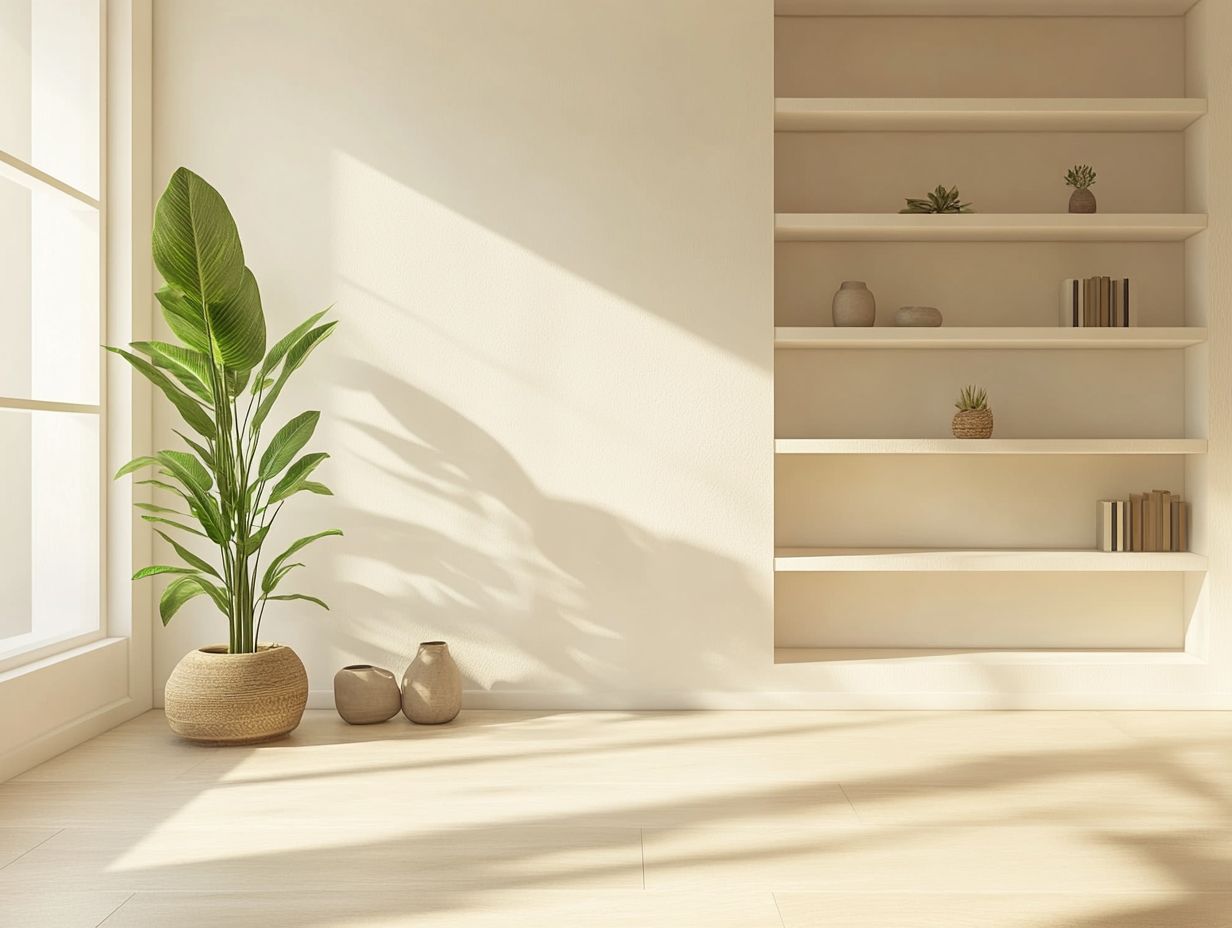
- Decluttering can significantly reduce stress, helping you feel more in control and calm.
- Set clear goals for your decluttering efforts to keep the process simple and effective.
- Create daily habits to maintain organization and tackle clutter at its source.
The Connection between Clutter and Mental Health
The link between clutter and mental health is strikingly significant. Clutter can deeply impact your emotional well-being, often resulting in heightened stress and anxiety. A disorganized living space acts not only as a visual distraction but also fosters mental overload, making it challenging for you to concentrate and uphold healthy habits.
Studies have demonstrated that both physical and emotional clutter can erode self-esteem and diminish overall life satisfaction. By grasping the nuances of this connection, you can create enhanced mental health through effective clutter management strategies.
Understanding the Impact of Clutter on Mental Well-Being
Understanding how clutter impacts your mental well-being is crucial. A disorganized environment can contribute to emotional distress and hinder your overall health.
Consider your workspace. A chaotic area filled with papers and misplaced tools can easily lead to feelings of overwhelm and anxiety, making it difficult for you to focus on the tasks at hand.
Similarly, clutter in your personal spaces like a messy living room or bedroom can create a sense of unease and distraction, preventing you from truly relaxing. This disarray might even trigger stress hormones, leaving you feeling fatigued and irritable.
On the flip side, maintaining a tidy environment not only promotes clarity of thought but also boosts your productivity and fosters a sense of calm. By prioritizing organization and understanding the impact of a decluttered closet on lifestyle, you can significantly enhance your mental health, creating a space that supports emotional balance and overall happiness.
Benefits of Decluttering for Mental Health
Decluttering presents a wealth of benefits for mental health, easing stress and anxiety while creating an environment that nurtures emotional well-being and boosts productivity.
A tidy home can lift your mood, giving you the power to help you reclaim control over your surroundings and enjoy healing benefits.
By methodically tackling both physical and emotional clutter, you can foster a more focused and tranquil living space, paving the way for lasting lifestyle enhancements and psychological well-being. Incorporating mindfulness in closet decluttering can further enhance this process.
Reducing Stress and Anxiety
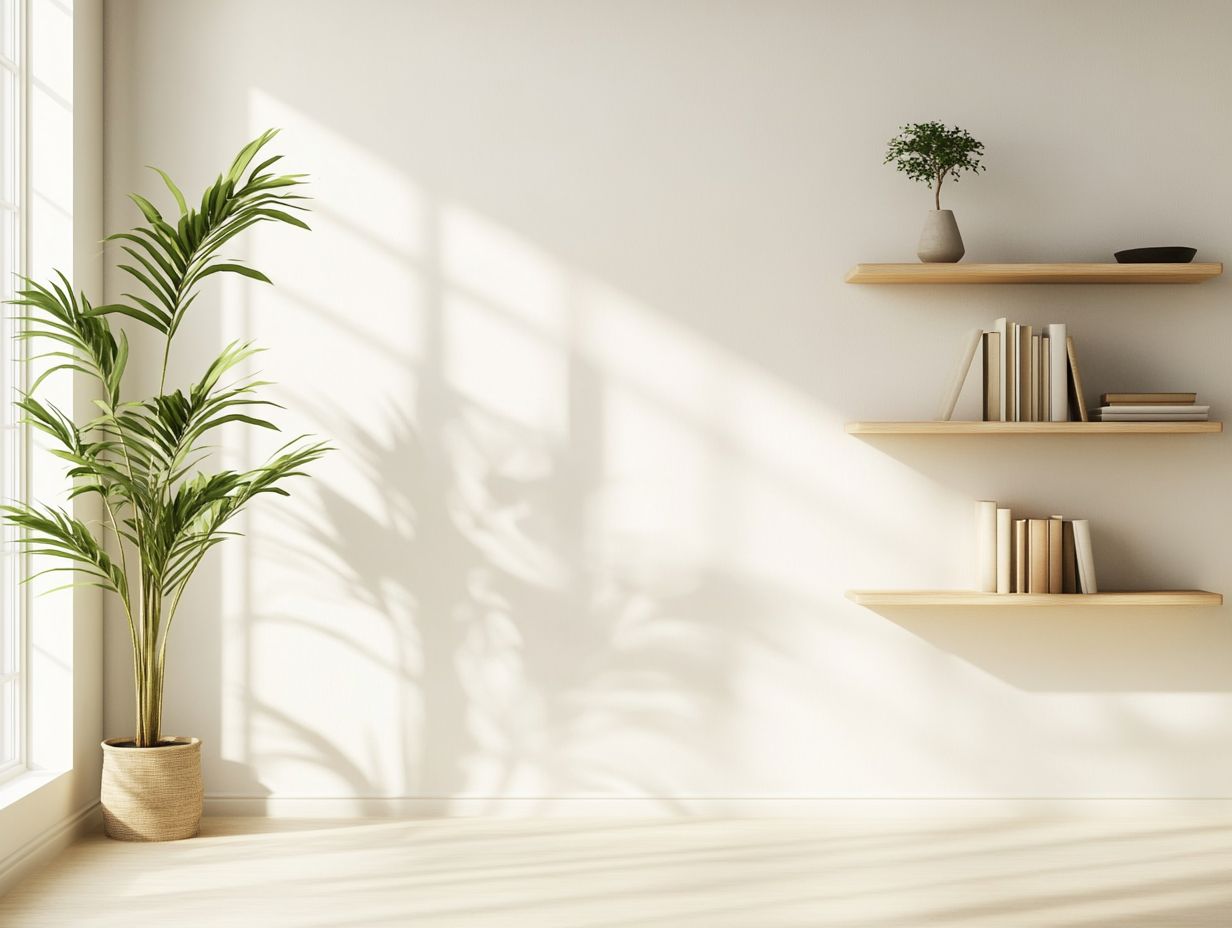
Reducing stress and anxiety through decluttering is a transformative journey you can embark on to enhance your mental health and overall well-being.
This journey not only clears your physical space but also fosters a clearer mindset. By systematically organizing your surroundings, you can experience a profound sense of control and accomplishment, which helps to alleviate feelings of overwhelm.
Strategies like the ‘one-in, one-out’ rule can assist you in maintaining an orderly environment, while designating specific times for decluttering makes the process feel much less daunting.
A serene space promotes calmness, reduces distractions, and even sparks creativity. Thus, engaging in decluttering becomes more than just a chore; it evolves into a vital way of taking care of yourself that nurtures your emotional stability and cultivates a peaceful sanctuary for your mind. Additionally, understanding the environmental benefits of decluttering can enhance this process.
Promoting a Sense of Control and Calm
Promoting a sense of control and calm is one of the most significant benefits you can gain from decluttering. This practice positively impacts your mental health and enhances your daily productivity.
When you take the time to organize your personal spaces, you ll often discover that this newfound order leads to increased efficiency in your daily tasks. For example, a well-arranged workspace can significantly minimize distractions. This allows you to tap into greater focus and creativity while tackling projects.
A tidy living area creates an environment that fosters relaxation. It helps to reduce stress levels and enhance emotional stability. Simple practices, like designating specific areas for essential items or sticking to a regular cleaning schedule, can also encourage healthier habits.
Ultimately, by mastering your surroundings, you can cultivate a deeper sense of peace that radiates into all other aspects of your life.
Tips for Decluttering Your Space
Get ready to transform your space with these effective strategies for decluttering your space. Not only can this improve your home organization, but it can also enhance your mental well-being, paving the way for a more productive and fulfilling lifestyle.
By embracing thoughtful cleaning tips and organizational methods, you can systematically address clutter management. Turn what may seem like an overwhelming task into a manageable endeavor.
Setting clear goals and utilizing efficient time management techniques can make the journey of decluttering enjoyable and rewarding.
Creating a Plan and Setting Realistic Goals
Creating a plan and setting realistic goals are essential steps in your decluttering journey. These steps keep you energized and focused on your decluttering journey!
Without a clear strategy, the daunting task of decluttering can quickly turn into a source of frustration. By identifying specific areas to tackle, you can break the process into manageable chunks. This makes it feel less overwhelming and far more achievable.
Employing time management techniques, like the Pomodoro Technique where you work for 25 minutes and take a 5-minute break or time blocking, allows you to allocate dedicated periods for sorting through your belongings. Prioritizing items based on necessity and emotional value streamlines your decision-making process.
Ultimately, cultivating an organized environment not only simplifies your decluttering experience but also enhances your overall productivity. This creates a more serene and functional space, especially when understanding the impact of clutter on well-being.
Practical Strategies for Sorting and Organizing
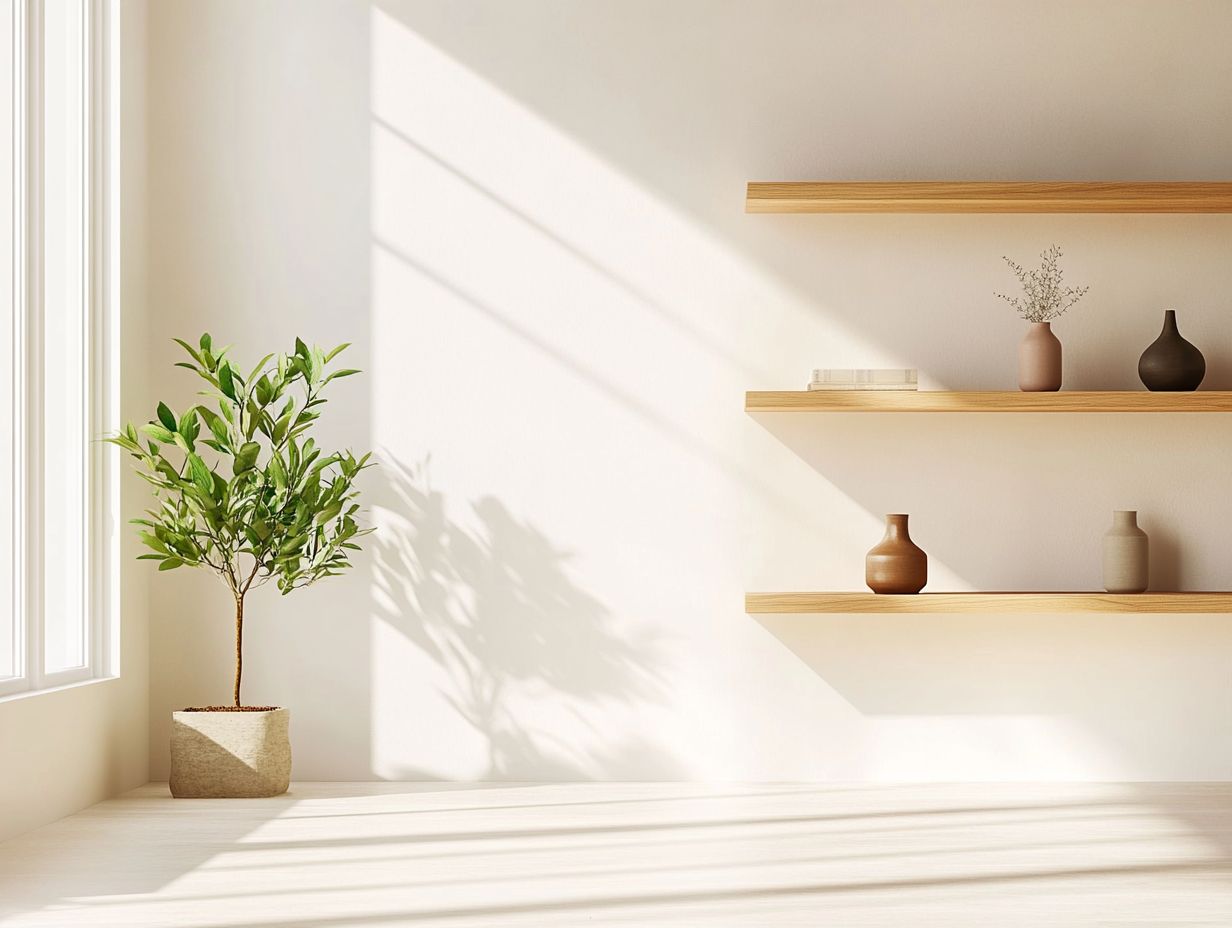
Practical strategies for sorting and organizing clutter can greatly enhance your decluttering process. This transforms it into a more efficient and enjoyable journey toward a tidy space.
Consider implementing the ‘one in, one out’ rule; it s a game-changer. This approach encourages you to maintain balance by ensuring that for every new item you bring into your home, an existing one must leave.
Categorizing items based on their usage is another effective tactic keep frequently used items easily accessible while stashing away seasonal goods to create a more efficient system.
The physical activity involved in decluttering does more than just tidy up your space; it promotes a healthier lifestyle and releases those feel-good endorphins. This leads to a clearer mental state. Not only does this enhance your focus, but it also reduces stress levels, cultivating a sense of accomplishment and control over your environment.
Ultimately, a clean space can significantly boost your well-being and productivity.
Maintaining a Decluttered Space
Maintaining a decluttered space is vital for sustaining the emotional and psychological benefits gained through the decluttering process. This commitment not only fosters long-term well-being but also enhances your productivity, allowing you to thrive in a more organized environment.
Set a weekly reminder to assess your space. This ongoing effort will help you keep your surroundings tidy and your mind clear.
Developing Habits to Stay Organized
Developing habits to stay organized is crucial on your decluttering journey, as consistent practices nurture a lifestyle improvement that significantly enhances your overall mental health.
By incorporating daily cleaning routines like setting aside just a few minutes each morning to tidy up your living space you can dramatically reduce distractions and create a serene environment.
Employing strategic organization methods, such as using storage bins or digital calendar systems, makes it easier to manage your daily tasks.
These habits streamline your productivity. They also help eliminate emotional clutter, increasing your focus and sense of accomplishment.
Embracing these effective practices can enhance your quality of life and give you the power to feel more in control and less overwhelmed by your surroundings. Understanding why decluttering is essential for minimalism can be a great first step. Start your decluttering journey today! Transform your space and your mind.
Dealing with Clutter Triggers
Dealing with clutter triggers things that lead to disorganization, like sentimental items or life changes is vital for maintaining a serene space and preventing emotional clutter from creeping back in, ultimately boosting your mental health.
Recognizing these triggers can illuminate the path to a more organized life. Common culprits often include items that no longer serve a purpose, sentimental objects that weigh heavily on your psyche, or sudden life changes like moving or job loss. Pay attention to the emotional responses that emerge when your surroundings start to feel overwhelming those feelings typically point directly to specific triggers.
Practical strategies, such as dedicating time each week to reassess your possessions or adopting the ‘one in, one out’ rule, can foster a healthier relationship with your belongings. By implementing organized storage solutions, you pave the way for long-term success, ensuring that clutter remains at bay and does not disrupt your daily life. To learn more about the importance of decluttering, check out why you should start decluttering today.
Frequently Asked Questions
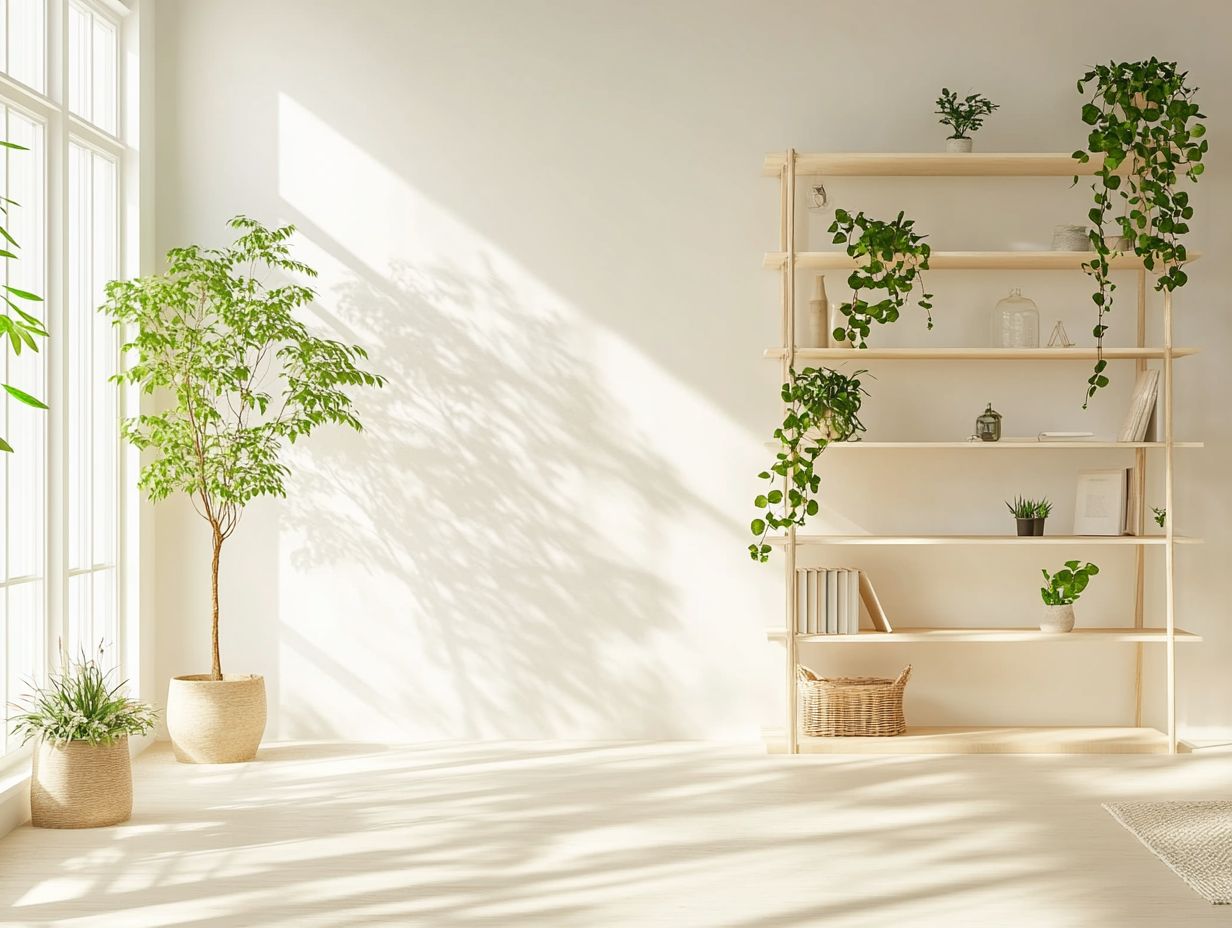
What is decluttering and how does it relate to mental health?
Decluttering is the process of organizing and getting rid of unnecessary items in one’s living space. It has been found to have a positive impact on mental health, as a cluttered environment can lead to feelings of anxiety, stress, and overwhelm.
Can decluttering really improve my mental health?
Yes, decluttering has been shown to have numerous benefits for mental health. It can help reduce stress, improve focus and productivity, and promote a sense of calm and relaxation.
How does decluttering reduce stress?
A cluttered living space can be overwhelming and can make it difficult to relax and unwind. By decluttering, you create a more visually appealing and organized space, which can help reduce stress levels and promote a sense of calm.
Can decluttering help with anxiety?
Yes, decluttering can help with anxiety as it reduces the visual and mental stimulation in one’s living space. This can help decrease feelings of overwhelm and anxiety and create a more calming environment.
How can decluttering improve my focus and productivity?
A cluttered space can be distracting and make it difficult to focus. By decluttering, you remove unnecessary items and create a more organized and efficient space, which can help improve focus and productivity.
How often should I declutter to maintain good mental health?
The frequency of decluttering can vary for each individual, but it is recommended to declutter at least once a year. Regular decluttering can help prevent the buildup of clutter and maintain a more organized and stress-free living space.

